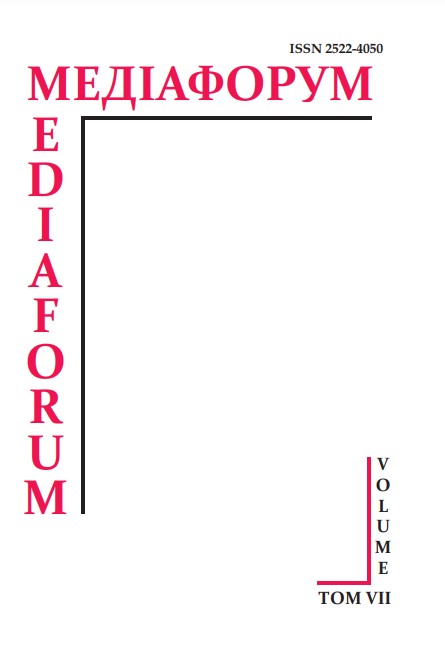Corruption Study Paradigm in Modern Political Science
DOI:
https://doi.org/10.31861/mediaforum.2019.7.285-304Keywords:
corruption, political corruption, political science, economic paradigm, cultural paradigm, neo-institutional paradigmAbstract
In the last decades a growing awareness emerged of the relevance of corruption as an hidden factor which may negatively affect political and economic decision-making processes. In spite of a lively scientific debate there is no general consensus on a commonly accepted definition of what corruption is. The A. distinguishes three main paradigms, focusing on different (though not irreconcilable) variables. The first is the economic paradigm, which usually takes the principal-agent model of corruption as its founding pillar. In this paradigm corruption is considered the outcome of rational individual choices, and its spread within a certain organization is influenced by the factors defining the structure of expected costs and rewards. A second approach – the cultural paradigm – looks at the differences in cultural traditions, social norms and interiorized values which shape individuals’ moral preferences and consideration of his social and institutional role. These are a leading forces that can push a corrupt public or private agent (not) to violate legal norms. A third neo-institutional approach considers also mechanisms which allow the internal regulation of social interactions within corrupt networks, and their effects on individuals’ beliefs and preferences. Though the corrupt agreements cannot be enforced with legal sanctions, several informal, nonwritten rules, contractual provisos and conventions may regulate the corrupt exchange between agent and corruptor. Corruption is the outcome of a multitude of individual and collective choices which change public opinion towards corruption and its diffusion throughout the state, markets and civil society. There is no univocal recipe to deal with anti-bribery measures, since corruption is a complex and multifaceted phenomenon. Reforms aimed at dismantling systemic corruption have to be finely tuned against its hidden governance structures, i.e. its internal regulation of exchanges and relationships. Otherwise, a vicious circle may emerge: the more an anticorruption policy is needed, because corruption is systemic and enforced by effective third-parties, the less probable its formulation and implementation. Only when official rules are complemented by coherent informal institutions, bottom-up initiatives, they tend to produce the expected outcomes and make anticorruption regulation more effective.
Downloads
References
Andreeva Y.A.. 2007. Sotsyalnaia adaptatsyia y poriadok: korruptsyia kak mekhanyzm ynteraktsyi v teoryy sotsyalnoho obmena / Y.A. Andreeva, A.M. Anokhyn // Vestnyk Sankt-Peterburhskoho unyversyteta MVD Rossyy. № 4. S. 189–198.
Baranov V.M., 2002. Tenevoe pravo. N. Novhorod.
Veber M., 1990. Polytyka kak pryzvanye y professyia // Veber M. Yzbrannye proyzvedenyia. M.: «Prohress».
Della Porta D., 1997. Deistvuiushchye lytsa v korruptsyy: polytycheskye byznesmeny v Ytalyy // Mezhdunarodnyi zhurnal sotsyalnykh nauk. № 16. S. 55.
Kolodij A., 2011. Neoinsty`tucionalizm ta jogo piznaval`ni mozhly`vosti v polity`chny`x doslidzhennyax / Visny`k L`vivs`kogo untu. Vy`p. 1. S. 129-139.
Kushnar`ov I.V., 2017. Neoinsty`tucionalizm yak metodologichna pidvaly`na vy`vchennya neformal`ny`x insty`tutiv: pry`klad polity`chnoyi korupciyi. Polity`kus. Vy`p. 5. S. 16-20
Meny Y., 1997. Korruptsyia na rubezhe vekov: evoliutsyia, kryzys y sdvyh v tsennostnykh predstavlenyiakh // Mezhdunar. zhurn. sotsyalnykh nauk. Paryzh, M. № 16. C. 7-20.
Olson M., 1998. Vozvyshenye y upadok narodov: ekonomycheskyi rost, stahfliatsyia, sotsyalnyi skleroz. Novosybyrsk: EKOR. 401 s.
Pershyn N.Y.. 2008. Korruptsyia – teoryia y zhyzn // Yzvestyia Volhohradskoho hosudarstvennoho tekhnycheskoho unyversyteta. T. 7. № 5. S. 50–55.
Politychna nauka v Ukraini, 2016. 1991-2016: u 2 t. T.1 Politychna nauka: zakhidni trendy rozvytku y ukrainska spetsyfika / NAN Ukrainy, In-t polit. i etnonats. doslidzhen im. I.F. Kurasa K.: Paralam. vyd-vo. 656 s.
Porta D. della, 1997. Deistvuiushchye lytsa v korruptsyy: Polytycheskye byznesmeny v Ytalyy // Mezhdunar. zhurn. sotsyalnykh nauk. Paryzh, M. № 16.C. 55-73.
Rouz-Akkerman S., 1997. Demokratyia y «velykaia» korruptsyia // Mezhdunar. zhurn. sotsyalnykh nauk. Paryzh, M. № 16. S. 75-95.
Rouz-Akkerman S., 2003. Korruptsyia y hosudarstvo. Prychyny, sledstvyia, reformы. M.
Satarov H.A., 2003. Nekotorye zadachy y problemy sotsyolohyy korruptsyy // Sotsyolohyia korruptsyy: materyaly nauchno-praktycheskoi konferentsyy. M. S. 32–33.
Systemy obshchehosudarstvennoi etyky povedenyia: posobye Transparensy Ynterneshnl / pod red. Dzheremy Poupa. M., 2017.
Shy`shkarev S.N., 2009. Socy`al`no-pravovaya sushhnost` y` osnovnыe pry`znaky` korrupcy`y` // Vestny`k Moskovskogo un-ta. # 5. S. 174-179.
Bayley D.H., 1966. The Effects of Corruption in a Developing Nation // Western Political Quarterly. Vol. 19. № 4.
Cartier-Bresson J., 1993. Corruption, pouvoir discretionnaire et rents// Debat.- P. N 77.P.26-32.
D., Vannucci, A. 2015. Three paradigms for the analysis of corruption. URL: URL:file:///D:/%D1%82%D0%B8%D0%B7%D0%B5%D1%80%D1%8B/5468-15637-2-PB%20(1).pdf
Della Porta, D., J. Font and Y. Syntomer (eds), 2014. Participatory democracy in Southern Europe, Rowman and Littlefield.
Friedrich Carl J., 2006. Corruption Concepts in Historical Perspective / Political corruption. A handbook. Edited by A.J. Heidenmeier, V.T. LeVine. New Brunswick, N.J., Oxford.
Leff N., 1964 Economic development through bureacratic corruption // American behavioural scientist. Beverly Hills. N 2. P.8-14.
Leyes C., 2010. What is the Problem About Corruption? // Journal of Modern African Studies. Vol. 3. № 26.
Rose-Ackerman S., 1978. Corruption: A Stady in Political Economy. N.Y. : Acad. press. XII, 258 p.
Theobald R., 1990. Corruption, development and underdevelopment. - Basingstoke; L.: Macmillan. XI, 191 p.














